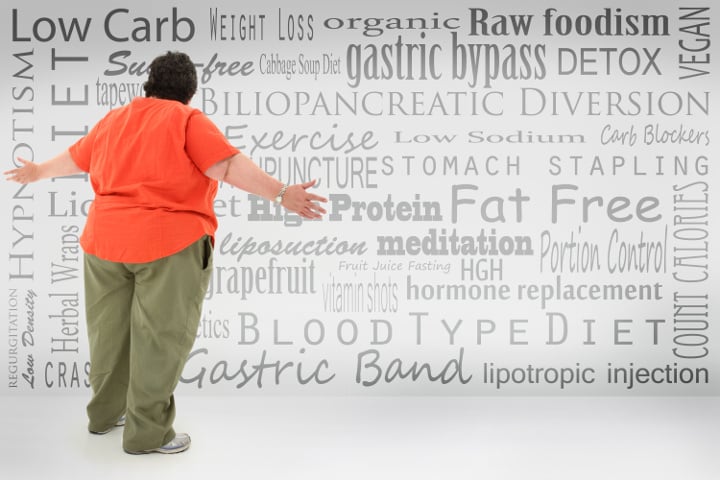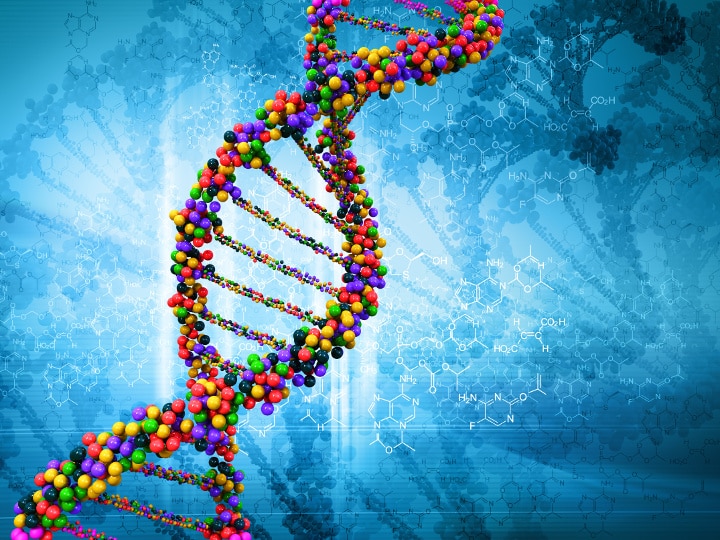Help, I Can’t Lose Weight! [What to Do When Diet Isn’t Enough]

If you’re like countless others trying to lose weight, you’ve tried diets, exercise, supplements and just about everything else under the sun to shed those unwanted pounds.
But, despite it all, you just can’t lose weight—or keep it off.
So, what gives?
In this article, we’ll share some of the common reasons that so many people struggle to sustainably lose weight.
We’ll explain how underlying medical issues, lifestyle factors, and emotional and psychological factors might be sabotaging your best efforts.
Then, once you’re better equipped to identify what’s keep you from reaching your goals, we’ll point you toward effective solutions.
You don’t have to keep waging an endless uphill battle. With the right insights and strategies, you can continue on your weight loss journey with greater self-compassion, confidence, and better results.
Curious if hypnosis could help you lose weight?
Take our hypnotizability test and find out!
What If You’re Eating Healthy and Exercising but Still Can’t Lose Weight?
If your hard work hasn’t translated to desired drops on the scale, you’re probably asking, “Why can’t I lose weight?”
Rest assured, you’re not alone in your frustration.
Like many people, you may have tried a 12-week weight loss program or reduced calorie consumption as low as 1200/day only to find that your scale hasn’t budged. Or, even more alarming, the numbers move in the wrong direction!
Disappointing weight loss results can make anyone feel down and defeated. You might wonder if you’re doing something wrong. You want to be healthy and you’re working hard, so why does reaching your fitness goals seem so impossible?
Before we go any further: It’s entirely possible to be healthy even when you’re not at your desired weight or body type.
Now stay with me for a moment.
Although many people struggle with body image and pressure to reach a certain size, your weight and measurements don’t actually say much about your overall health. Take this study that shows how genetics influence both your weight and where your body stores fat.
Weight and measurements also don’t say much about your attractiveness (or anything at all about your worth as a person). Just take a look at how much “the ideal woman’s” body type changes from country to country, as well as throughout history. “The ideal man” has changed over time as well.
I know what you’re thinking.
“What if you know that you really are overweight or out-of-shape? What if you know you need to make a change?”
As I’ll explain later, feelings of shame and guilt rarely help anyone lose weight—at least not in healthy or sustainable ways.
For many people, losing weight is hard. Keeping it off can be even harder. And there are real reasons for that—it isn’t all about willpower.
When you’re able to learn about why you may be struggling without hating or blaming yourself, you’re more likely to make smart choices and experience the transformation you’ve been longing for.
For example, let’s take stubborn belly fat. Difficulty losing weight in the stomach is one of the most common fitness complaints.
But why?
It could be that you’re simply getting older. Age slows your metabolism, making weight loss more difficult after 40. This is especially true for women who have experienced menopause’s hormone changes.
It’s also possible that you’re drinking too much too much alcohol, relying on the wrong workout, eating lots of processed foods, or neglecting your sleep.
So, what’s the bottom line?
You deserve to feel good about yourself and your body. And once you know what your weight loss hurdles look like, you can overcome them.
A quick disclaimer: This guide is meant to help you achieve your weight loss goals, but it is not medical advice. Please consult a medical or mental health professional if you are experiencing concerning symptoms.
Now let’s get started.
Underlying Health Conditions (and How They Limit Weight Loss)
No matter where you store fat, difficulty losing weight could be a sign of an underlying, possibly undiagnosed health condition.
Overall physical health plays a crucial role in weight management.
Many people struggle to lose weight without realizing they have an underlying health condition. Others have a diagnosis, but don’t know how to effectively address symptoms.
Some health conditions can also lead to physical exhaustion, not to mention time-consuming doctor’s appointments and medical treatments.
It’s no wonder that underlying medical conditions often interrupt weight loss.
Here are some of the most common medical reasons you might be saying, “I can’t lose weight!” (and how you can start addressing these issues today).
Down-Regulated Metabolism (Starvation Mode)
Starvation mode occurs when your body isn’t getting enough calories to fuel its basic functions. Even when you’re sleeping, your body needs energy to pump blood and absorb oxygen.
How Starvation Mode Affects Weight Loss
Moderate calorie restriction prompts your body to burn stored fat for energy. Overly strict caloric restriction, on the other hand, makes your body panic and react as though it is starving.
As a result, your body starts preparing for an energy shortage emergency. That means it begins “eating” lean tissue and clinging to fat stores.
Starvation mode also leads your body to slow down its basic functions, which leads to a slower metabolism (and makes it harder to lose weight).
“Yo-yo dieting” is the worst culprit here. When you frequently start and stop different diets (or the same one), your body goes through periods of caloric deprivation followed by caloric abundance.
But, your system doesn’t trust that the abundance will last.
Instead, your body eagerly stores calories to prepare for the next period of starvation. In fact, studies show that inconsistent caloric intake will “lead to a greater fat storage than if food was always abundant.”
Yo-yo dieting also impacts the immune system and gut bacteria, (which you’ll read more about later). As a result, yo-yo dieting and starvation mode make it exceptionally difficult to lose weight and keep weight off.
Signs of Starvation Mode
Signs and symptoms of starvation mode include:
- Anxiety and depression
- Food obsession (e.g., fixation on cooking shows, menus, or pictures of food; fantasies about food)
- Fatigue and fogginess
- Irregular or absent menstruation
- Anemia
- Digestion issues
- Hair loss
- Brittle fingernails
- Low body temperature
How to Get Out of Starvation Mode
There are many things you can do to get out of starvation mode and bring your metabolism back up to speed:
- Stress reduction. Relaxing with meditation and deep breathing can restore your physiological balance and help your metabolism function properly.
- Exercise. Burst training, high-intensity interval training, and metabolic resistance training are ideal for boosting metabolism.
- Reverse Dieting. Stopping the cycle of yo-yo dieting and consistently giving your body enough calories can help you break out of starvation mode.
You can learn much more about reverse dieting and how to boost your metabolism in our “Ultimate Guide to Fast Metabolism (What It Is & How to Get It).”
Insomnia
People with insomnia struggle to fall and stay asleep, which can lead to a number of weight loss and health challenges.
How Insomnia Affects Weight Loss
 Sleep deprivation lowers impulse control. That makes it harder to resist unhealthy, high-calorie sugary and starchy foods.
Sleep deprivation lowers impulse control. That makes it harder to resist unhealthy, high-calorie sugary and starchy foods.
Researchers from St. Luke’s-Roosevelt Hospital Center and Columbia University found that a sleep-deprived brain’s reward center is more likely to respond to images of cake and pizza than fruits and veggies.
In addition, the study found that “participants ate more overall and consumed more fat after a period of sleep restriction [four hours a night] compared to regular sleep [nine hours].”
Sleep deprivation also raises cortisol, the “stress hormone” that makes it easier to store fat and harder to burn it.
Eating more and burning less is a recipe for stunted weight loss.
Signs of Insomnia
If you know you’re not getting enough sleep, you might already suspect that you could have insomnia. Even when you try to get a full eight or nine hours, you might toss and turn, wake up in the middle of the night, or wake up an hour before your alarm.
It’s also possible to be sleep deprived even if you think you’re getting enough sleep. Signs of insomnia include:
- Sleepiness and fatigue during the day
- Brain fog, difficulty focusing, and slowed reactions
- Stress, low mood, and irritability
- Increased mistakes (e.g., missing a traffic signal or forgetting a deadline)
If you never feel well-rested, then insomnia might be one of the medical reasons that you’re not losing weight.
How to Get a Good Night’s Sleep
To give your brain the rest it needs to function well, try:
- Putting down electronics an hour before bedtime (no smartphones in bed!)
- Mindfulness meditation and other relaxation techniques
- Avoiding alcohol, caffeine, nicotine, and other substances
- Avoiding food in the hours leading up to bed-time
- Creating a healthier work-life balance
- Sleeping in a cool, dark room
Inflammation
Inflammation is normally a healthy part of the body’s immune response. However, chronic inflammation occurs when that natural response goes awry.
How Chronic Inflammation Affects Weight Loss
Inflammation can harm your thyroid, which, in turn, slows your metabolism. A slower metabolism makes it much harder to lose weight.
Chronic inflammation can also confuse your body’s hunger signals, making you want to eat when you’re not physically hungry. It’s also been linked with to increased insulin resistance.
Many studies show a link between increased inflammation and increased body fat. For example, this 2003 study shows that “elevated [inflammation-sensitive plasma protein] levels predict a large weight gain in middle-aged men.”
Signs of Inflammation
You might have chronic inflammation if you:
- Have excess belly fat
- Have an autoimmune disease
- Are regularly exposed to chemicals
- Have high blood sugar
- Have skin sensitivities or conditions like eczema or psoriasis
- Have gum disease
- Have allergies
- Struggle with digestive issues, including bloating
- Have a puffy face or eyes
- Feel fatigued and foggy
How to Reduce Inflammation
The best way to reduce inflammation is to eat an anti-inflammatory diet. That means swapping processed snacks, refined grains, gluten, high fructose corn syrup, and other inflammatory foods for ingredients that are rich in omega-3 fatty acids, antioxidants, and polyphenol.
Anti-inflammatory foods include:
- blueberries
- avocados
- leafy greens
- lentils
- salmon
- green tea
But the real secret is turmeric. Turmeric is an excellent anti-inflammatory and an essential ingredient in any anti-inflammation, fast-metabolism diet.
Sugar Addiction
Sugar addiction is exactly what it sounds like—a compulsive, physiological desire to eat sugar.
How Sugar Addiction Affects Weight Loss
 Studies conducted with rats show that sugar releases dopamine, the chemical that makes us feel pleasure. Further studies show that these rats can develop a tolerance to sugar’s effects. That means it takes more sugar to release the wanted “hit” of dopamine.
Studies conducted with rats show that sugar releases dopamine, the chemical that makes us feel pleasure. Further studies show that these rats can develop a tolerance to sugar’s effects. That means it takes more sugar to release the wanted “hit” of dopamine.
This cycle of want, tolerance, and increase is the foundation of addiction. Check out this slideshow that explains how sugar leaves your brain and body wanting more.
Excess sugar intake can also lead to candida overgrowth in your digestive system. Candida is a yeast that feeds off sugar, and the more it grows, the more intense your sugar cravings can become.
And, when the desire for sugar is biological, it’s harder to resist eating high-carb, highly processed foods.
As a result, sugar addiction can lead to yo-yo dieting and compulsive overeating, both of which lead to stunted weight loss and obesity.
Signs of Sugar Addiction
Sugar addiction might be limiting your weight loss if:
- Your energy levels often swing high and drop low
- You regularly have intense cravings for sugary, high carb foods
- You often eat more than you intend to, even to the point of sickness
- You crave bland, starchy food (e.g., white bread)
How to Break Out of Sugar Addiction
Breaking sugar addiction is straightforward—but it’s not always easy.
You have to stop the addiction in its tracks by committing to a very low carb diet or sugar detox.
By removing processed sugars from your diet, you can reduce cravings, balance your blood sugar, and stop the addiction cycle.
Gut Dysbiosis (SIBO, Candida Overgrowth)
Gut dysbiosis is a state of unbalanced bacteria in your digestive system.
How Gut Dysbiosis Affects Weight Loss
When the bacteria in your digestive system are out of balance, they interrupt your digestive function.
Candida overgrowth is one common form of gut dysbiosis.
Candida is usually a benign form of bacteria that helps with digestion and nutrient absorption. However, when you’re stressed, over-tired, drinking too much alcohol, or eating a poor diet, candida capitalizes on your over-taxed digestive system and starts to grow.
Why is that a problem?
Well, candida feeds on sugar. Eating too much sugar fuels its growth. Candida overgrowth fuels sugar cravings. As mentioned above, candida is a key player in the cycle of sugar addiction.
Another form of dysbiosis is small intestinal bacterial overgrowth (SIBO). Studies show that SIBO can make it difficult for your body to absorb fat or sugar. And while SIBO can lead to involuntary weight loss, over the long-term, it can slow your metabolism and impact the hunger signals you get from insulin and leptin.
Overall, if your digestive system is out of balance, so is your weight loss plan.
Signs of Gut Dysbiosis
Symptoms of gut dysbiosis include:
- Bloating, diarrhea, constipation, and other forms of indigestion
- Abdominal pain
- Acne and skin irritation
- Fatigue
- Food allergies
How to Heal Gut Dysbiosis
To rebalance your gut, you need to change your diet.
A low carb, high fat diet is especially effective for halting candida overgrowth and SIBO.
Learn more about the benefits of a low carb, high fat (LCHF) ketogenic diet and how you can get started.
Adrenal Fatigue & Insufficiency
 According to the Mayo Clinic, “Your adrenal glands produce a variety of hormones that are essential to life. The medical term adrenal insufficiency (Addison’s disease) refers to inadequate production of one or more of these hormones as a result of an underlying disease.”
According to the Mayo Clinic, “Your adrenal glands produce a variety of hormones that are essential to life. The medical term adrenal insufficiency (Addison’s disease) refers to inadequate production of one or more of these hormones as a result of an underlying disease.”
Adrenal fatigue, sometimes also known as adrenal dysfunction, is thought to be a mild form of adrenal insufficiency. Chronic stress overtaxes your adrenal glands, which leads to exhaustion and low functioning.
Although the condition of adrenal fatigue is considered controversial among many in the conventional medicine community, it is increasingly recognized as a real and common condition by conventional, functional, and alternative doctors alike.
How Adrenal Fatigue Affects Weight Loss
Those struggling with adrenal fatigue symptoms report increased cravings for salt and sugar. As we noted earlier, sugar affects weight loss in a variety of ways. And while salt doesn’t directly impact fat storage, it increases water retention, which leave you feeling bloated and increase the numbers you see on the scale.
Adrenal fatigue may also cause trouble falling asleep. As we discussed above, inadequate sleep can make it difficult to resist cravings, sustain a healthy diet and lose weight.
Adrenal dysregulation also goes hand-in-hand with stress and excessive production of the “stress hormone” cortisol, which studies link to obesity.
Signs of Adrenal Fatigue
Reported symptoms of adrenal fatigue include:
- Difficulty falling asleep, difficulty waking up, and fatigue, especially in the mid- to late-afternoon
- Waking up between 2–4 a.m. and not being able to fall back asleep
- Reliance on caffeine and/or other stimulants
- Cravings for sugar and salt
- Loss of body hair
- Low blood pressure
- Lightheadedness
- Body aches
- Skin discoloration
How to Address Adrenal Fatigue
Those who report suffering from adrenal fatigue generally address symptoms through practicing healthy sleep hygiene, eating a nutritious diet, and increasing exercise.
It’s also recommended that you quit nicotine (especially cigarettes), alcohol, caffeine, and other substances.
Adrenal fatigue progresses in stages, each of which requires unique methods of treatment. If you think you might be suffering from adrenal problems, consult with a healthcare practitioner experienced in diagnosing and treating these issues, such as a functional medicine practitioner.
Hypothyroidism
According to The National Institute of Diabetes and Digestive and Kidney Diseases (NIDDK), hypothyroidism, “also called underactive thyroid, is when the thyroid gland doesn’t make enough thyroid hormones to meet your body’s needs.”
How Hypothyroidism Affects Weight Loss
Studies show that hypothyroidism may be one of the most common medical reasons why many people gain and can’t lose weight. In the US, nearly five percent of the population (teens and adults) struggle with this condition.
Thyroid hormones are a key part of your metabolic function, which means that play a crucial role in how your entire body uses energy.
When your body doesn’t have enough thyroid hormones, it doesn’t have the tools it needs to effectively process calories. So, even if you’re reducing calories, exercising, and otherwise following standard weight loss suggestions, your system doesn’t know how to appropriately burn calories and build muscle.
An underactive thyroid has also been linked to insulin resistance.
It can be extremely frustrating to attempt to lose weight with hypothyroidism, whether you have been diagnosed or not. And, studies indicate that late recognition of hypothyroidism—along with delayed or insufficient treatment—can lead to greater weight gain.
Signs of Hypothyroidism
To begin treatment of hypothyroidism as soon as possible, it’s important to recognize symptoms, which include:
- Bloating and puffiness in the face
- Sensitivity to cold
- Dry skin and dry hair (with hair loss)
- Decreased sweat production
- Fertility issues and irregular menstruation
- Goiter (enlarged thyroid gland, in the throat)
- Constipation
- Aching, painful joints and muscles
- Slowed heart rate
- Depression
- Fatigue
Is It Possible to Lose Weight With Hypothyroidism?
It most certainly is!
First, consult your doctor to test your thyroid and verify your diagnosis. Then, you can discuss treatment options. However, medication does not guarantee weight loss.
So, how can you lose weight with thyroid medication—or without?
Naturopathic doctors and endocrinologists suggest that you:
- Keep a food diary so you know exactly what and how much you’re eating
- Swap three square meals for many small meals throughout the day
- Adopt a low carb, low sugar diet and eliminate simple carbs (e.g., sugary soda)
- Avoid or eliminate gluten, as gluten is linked to thyroid disorders
- Eat an anti-inflammation diet, including leafy greens, nuts, berries, and turmeric
- Exercise with short interval, high-intensity training, which boosts your metabolism and helps balance thyroid hormones long after the exercise is over.
Using these tips and more, it is possible to lose weight with hypothyroidism naturally.
Sex Hormone Imbalances
Andropause, or “male menopause,” refers to a decrease in testosterone in men. Many men experience testosterone drops as they age.
Estrogen dominance can impact both men and women. It refers to excessive levels of estrogen and low levels of testosterone and progesterone.
How Sex Hormones Affect Weight Loss
Testosterone
Testosterone is generally considered the “male sex hormone” because it appears in much higher quantities in men. However, both men and women have and need testosterone. It’s responsible for helping the body create lean muscle, along with sustaining physical energy and an active libido.
Studies show a link between low testosterone and obesity, and it seems that the relationship works both ways. Lower testosterone leads to weight gain and loss of lean muscle, while high body fat leads to low testosterone.
According to Abraham Morgentaler, MD, an associate clinical professor of urology at Harvard Medical School and director and founder of Men’s Health Boston, “Testosterone has a critical role in metabolism.” Lower testosterone means a slower metabolism, which means challenges losing weight.
Progesterone
Both men and women also have progesterone, although women have it in higher quantities.
Like testosterone, progesterone supports a healthy metabolism and sex drive. It also fosters healthy thyroid function and balances blood sugar—all important functions for reaching and maintaining a healthy weight.
When testosterone and progesterone drop, they make room for estrogen to take over.
Estrogen
Like both aforementioned sex hormones, estrogen plays a role in male and female health. It is often known as the “female sex hormone” because it is more prevalent in women.
Estrogen encourages fluid and salt retention, slows the thyroids, and deregulates blood sugar. It also encourages fat storage. This all serves to make estrogen dominance the perfect storm for weight loss resistance.
Studies link estrogen dominance—often caused by exposure to chemicals or hormone-laden food—to obesity. It’s especially common for those with elevated estrogen to carry more stubborn belly fat.
Signs of Andropause and Estrogen Dominance
You may have a sex hormone imbalance if you are struggling with:
- Low energy and fatigue
- Low libido
- Muscle loss and trouble building muscle
- Endometriosis
- Poor sleep
- Hair loss or lack of body hair
- Ongoing PMS symptoms, hot flashes, and irregular menstruation
- Depression, anxiety, irritability, and brain fog
How to Manage Andropause and Estrogen Dominance
Hormone expert Dr. Sara Gottfried recommends upping your fiber by eating a pound of vegetables a day. Fiber is thought to help the body shed overflows of estrogen.
You can also eliminate hormone-laden foods—including milk and meat treated with growth hormones—from your diet. Some experts recommend avoiding soy as well.
Because body fat encourages the body to make even more estrogen, you should also include fat-burning, muscle-building exercises into your routine. That way you can shed fat and interrupt the cycle of estrogen dominance.
For men with andropause, a healthy lifestyle that includes exercise and a nutritious diet may be all it takes to balance testosterone levels. If that doesn’t help or symptoms are worsening, your doctor may recommend testosterone replacement therapy, which could include injections, patches, or a topical gel.
Insulin Resistance
Insulin is a key player in your metabolism, as it helps the body absorb and use sugar (glucose). According to NIDDK, insulin resistance means that your “muscle, fat, and liver cells do not respond properly to insulin.” And so, your body can’t convert sugar into energy.
How Insulin Resistance Affects Weight Loss
Your body tries to adjust for insulin resistance by producing more insulin. But at some point, it just can’t keep up.
When your body can’t process sugar properly, it starts to build up in the blood stream. Your system attempts to deal with this dangerous backup by storing the extra energy as fat.
In addition to storing more fat and making weight loss more difficult, insulin resistance can lead to diabetes.
Signs of Insulin Resistance
The NIDDK notes that insulin resistance typically has no symptoms. However, there are signs to look out for.
For example, “A waist measurement of 40 inches or more for men and 35 inches or more for women is linked to insulin resistance.”
You might also be experiencing other typical signs of low metabolism, such as fatigue and brittle hair or nails.
If you are concerned about insulin levels, we recommend reading, “Is High Insulin Sabotaging Your Weight Loss? (and What Can You Do About It?)” to learn more.
How to Counteract Insulin Resistance
Cutting sugars and processed foods in favor of nutritious, whole foods is the first step to helping your body rebalance blood sugar and insulin production.
Fat-burning exercise is also crucial, as insulin promotes fat storage and can prevent fat utilization.
Leptin Resistance
Produced by fat, leptin is the “hunger hormone” that tells your body when you’ve had enough food or stored enough energy. When you suffer from leptin resistance, your appetite doesn’t get the message.
How Leptin Resistance Affects Weight Loss
When your brain and body don’t recognize that you already have plenty of fat saved up, your system encourages you to continue eating. At the same time your hunger increases, your metabolism slows down.
And even though you start storing more fat, which produces more leptin, your body and brain still don’t respond. In fact, more fat increases leptin resistance, which increases fat storage. This loop leads to an insatiable appetite and weight gain.
Studies also show that eating high amounts of sugar can trigger leptin resistance, which makes that sugar more likely to stick around as fat.
Signs of Leptin Resistance
If you never feel satisfied or full, even when you are eating enough, you might have leptin resistance.
You may also feel tired all the time, as your body isn’t appropriately noticing calories or processing them into energy.
How to Repair Leptin Resistance
As with many of these medical conditions, a good diet and exercise routine is crucial for addressing leptin resistance. Because sugar increases leptin resistance, try eliminating processed, carb-laden foods from your diet. Instead, eat foods rich in omega-3s fatty acids, like spinach, grass-fed beef, and fish oil.
You should also try to get plenty of sleep and reduce stress.
Genetics
How Genetics Affect Weight Loss
Some genetic differences can be easy to spot: eye color, hair color, etc. And some of these easily identifiable traits, such as height and body size, affect your metabolism and, as a result, your efforts to lose weight.
The taller you are, the more calories your body needs to function and the faster your metabolism works to get you the energy you need. On the flip side, shorter, smaller people typically have a slower metabolism.
Scientists have also identified a harder-to-spot way that genetics affect weight loss.
In a 2004 study, researchers discovered two genes that relate to body fat: CYP19 and the COMT.
They discovered that study participants with two CYP19 genes lost more weight with exercise than those with none or one.
And, participants with one CYP19 gene and a specific genotype of the COMT gene also lowered their BMI and body fat more than those without.
To make matters more interesting, one CYP19 variant correlated with weight loss for exercisers, but weight gain for non-exercisers.
While scientists are still discovering more about the relationship between genetics and weight loss, one thing is clear: some factors are encoded in your DNA.
Signs Your Genetics Are Stopping Your Weight Loss
If your immediate family members also struggle to lose weight, or if you simply can’t think of any other reason why your diet and exercise routine isn’t giving you the results you’ve seen others enjoy, the culprit might be your genes.
Don’t worry, though. Even if you’re naturally predisposed to retain fat, there are steps you can take to lose weight.
How to Match Your Genes with Your Goals
DNA testing can help you find answers and figure out a weight loss plan that will work for you.
An individually tailored diet and exercise plan can also help you work through trouble spots.
After all, every person is unique. And your weight management program should be, too.
Medications
How Medications Affects Weight Loss
A number of the underlying health conditions we mention above are commonly treated with medication: insomnia, hypothyroidism, sex hormone imbalances, insulin resistance and diabetes, and more.
However, according to the University of Rochester Medical Center’s Health Encyclopedia, some medications are linked to weight gain. They might boost your appetite, slow your metabolism, or increase water retention. This includes diabetes medications like insulin, thiazolidinediones, and sulfonylureas and hormone drugs like birth control pills.
Other medications that cause weight gain include:
- Haloperidol, clozapine, and lithium (antipsychotics)
- Amitriptyline, paroxetine, and sertraline (antidepressants)
- Valproate and carbamazepine (epilepsy treatment)
- Beta-blockers (for blood pressure).
Even medications that don’t directly cause weight gain—including those that typically suppress appetite—can make it difficult to lose weight. For example, stimulants can lead to insomnia, which leads to poorer food choices.
Some medication also increases your heart rate or cause shortness of breath, which makes exercise unappealing.
Signs Medication Is Behind Your Weight Loss Struggle
If you gained weight soon after starting a new medication, it’s reasonable to suspect that it might be playing a role in how your body stores and burns fat.
Look out for the signs and side-effects of underlying health conditions mentioned above, and consider whether or not they might be impacting your diet or exercise.
How to Lose Weight on Medication and/or with Functional Medicine
Do not stop taking any prescribed medication!
Instead, consult with your doctor to review your options. You may be surprised to discover a new alternative.
It’s also a good idea to consult with a doctor or healthcare professional who specializes in Functional Medicine.
Functional Medicine focuses on treating the root cause of a condition, rather than treating the condition itself.
Why consider Functional Medicine?
One condition can have many causes, just as one cause can lead to many conditions. Similarly, many different conditions share similar symptoms, which means some diagnoses and treatments won’t actually address the root cause.
The Functional Medicine approach takes into account genetics, lifestyle, and environment, as well as personal, medical, social, and family history.
By looking at the whole person in this manner, medical practitioners can help you go beyond symptom relief and enjoy greater overall well-being.
Heavy Metal Toxicity
 Many of us have so-called amalgam or “silver” fillings in our teeth. Those fillings are 50% mercury, and combined with the exposure to mercury from other modern sources, such as fish, some beauty products, and pollution from coal-fired power plants, you may have more mercury in your system than you think.
Many of us have so-called amalgam or “silver” fillings in our teeth. Those fillings are 50% mercury, and combined with the exposure to mercury from other modern sources, such as fish, some beauty products, and pollution from coal-fired power plants, you may have more mercury in your system than you think.
That mercury might be interfering with many different processes in your body, including some that affect your metabolism and your ability to lose weight (it can actually create a tendency to gain weight).
For example, mercury is known to disrupt the pituitary, thyroid, adrenal glands, and pancreas—all of which are central to how you burn (and store) fat. Hormones that appear to be the most affected by mercury are insulin, estrogen, testosterone, and adrenaline.
The good news is that testing your body’s mercury load and treating any excess are fairly straightforward with the help of a qualified health practitioner.
So if you’ve had trouble shedding excess pounds despite your best efforts, find someone in your area who is experienced with diagnosing and treating toxicity from mercury and other heavy metals.
Lifestyle Factors (Lose These “Bad” Habits & Lose More Pounds)
 It’s easy to fall into unhealthy patterns, especially if you’re overworked and stretched thin. You might know that some of your habits are contributing to difficulty losing weight, but feel clueless about how to make a sustainable change.
It’s easy to fall into unhealthy patterns, especially if you’re overworked and stretched thin. You might know that some of your habits are contributing to difficulty losing weight, but feel clueless about how to make a sustainable change.
Many people also start developing “bad” habits from an early age. And if you didn’t grow up learning how to manage your weight and take care of your health, it can be difficult pinpointing which routines are healthy and which ones may need to change.
The following lifestyle factors are common reasons why many people can’t lose weight (or keep weight off).
Alcohol Consumption
How Alcohol Limits Weight Loss
You might be used to having a drink or two in the evening to wind down. Or, maybe drinking seems embedded in your social circle or work culture.
Either way, you might be imbibing way more calories than you realize.
A glass of wine is roughly 120 calories, while 12 ounces of beer can be as high as 320.
What’s worse is that calories from alcohol and any sugary ingredients in your favorite cocktail are all empty calories—that is, they offer no nutritional benefit. They also can contribute to sugar addiction and slow your metabolism.
Excessive alcohol consumption can also increase your appetite and lower your inhibitions, leading to unhealthy food choices and overeating. And, you’re more likely to wake up unrested, groggy, and possibly hungover—not great for going to the gym or sticking to your goals.
Also, alcohol is a fourth macronutrient (in addition to carbohydrates, protein, and fat) that contains 7 calories per gram—almost twice as many as carbohydrates and protein.
Alcohol is a toxin. Your system wants to process it as quickly as it can. So while your body is, processing and storing calories from alcohol, it’s not as effective in processing and absorbing more nutritious calories from real food.
According to a 2015 study, “alcohol may be a risk factor for obesity in some individuals, especially when consumed in large quantities,” or when those extra calories aren’t compensated for through diet and exercise.
Because alcohol contains empty calories and can make a healthy lifestyle difficult to maintain, it’s a weight loss resistance double-whammy.
Is Alcohol the Culprit?
If you are struggling to lose weight, honestly assess your drinking. Calculate how many calories are hidden in happy hour or your regular nightcap.
It’s worth noting that what you or a bartender considers “one drink” is likely to actually contain more alcohol than you expect. Studies show that “over-pouring [is] the norm.” And more alcohol means more calories and toxins.
Alcohol may be keeping you from losing weight if:
- you drink every day
- you’re a man who has more than 14 drinks a week
- you’re a woman who drinks more than 7 drinks a week
How to Cut Back on Alcohol
First, familiarize yourself with standard drink measurements and adjust your portions accordingly. For example, one serving of wine is 5 ounces and about 120 calories.
If you wish to continue drinking in moderation, measure your servings to make sure you aren’t underestimating your pours.
Or, you might want to eliminate alcohol from your diet completely. You can start by challenging yourself to 7 days of sobriety, then 14 days, then one month. You may be surprised by how good you feel and how easy abstaining from alcohol actually is.
If social drinking and networking events are a big part of your lifestyle, try ordering plain soda water with a wedge of lemon or lime. You can still participate in important events without sacrificing your health and wellbeing.
Underestimating How Many Calories You’re Consuming
How Calories Sneak In
Many people think they are consuming fewer calories than they are—even people who are keeping a close eye on their caloric intake.
Calories can sneak into your diet for a number of reasons.
First, it’s simply hard to remember everything you ate and drank throughout the day. It’s also easy to neglect things that seem insignificant, like a splash of cream in your coffee or a drizzle of dressing on your salad. And those calories add up.
Many people also struggle with portion distortion—they underestimate the size of their snack or meal, especially at restaurants. This remains true even when restaurants provide caloric estimates.
In one study of fast food consumption, “At least two thirds of all participants underestimated the calorie content of their meals, with about a quarter underestimating the calorie content by at least 500 calories.“
500 calories!
Another study found that people underestimate their calories when eating at a restaurant they perceive as “healthy.”
According to researcher Dr. Pierre Chandon, “People think that the same 1,000-calorie meal has 159 fewer calories if it comes from Subway than if it comes from McDonalds. If they choose to consume this fictitious ‘calorie credit’ on other food, and if they eat at Subway twice a week, they could gain an extra 4.9 pounds a year.”
It’s nearly impossible to lose weight when you don’t really know how much you’re eating.
Are You Consuming Hidden Calories?
If you don’t keep a food journal, prepare your own meals, and measure and weigh ingredients when cooking at home, you might be consuming hidden calories.
How to Count Calories Correctly
To stop consuming hidden calories, you have to stop relying on memory and estimates.
Instead, start keeping a thorough food journal. Track what you eat right after you eat it so you don’t forget. Or, plan your meals and calories at the beginning of the day (and stick to the plan).
Serving sizes are very difficult to accurately guess. Use a kitchen scale and measuring cups to get the most accurate assessment of your portions.
Finally, skip even the “healthy” fast food and try to make more meals at home. If your workweek is busy, plan and package meals ahead of time.
If you have struggled with eating disorders in the past, diligent calorie counting may feel overwhelming or even dangerous. Don’t put your health at risk. And remember that excessive calorie restriction can lead to starvation mode. Stay informed about what you’re eating and make choices that serve your overall wellbeing.
Wrong Type of Exercise
Inefficient Exercise and Fitness Plateaus
Many people are frustrated to find their hours at the gym haven’t translated into losses on the scale.
If this is your situation, don’t blame yourself. It’s not that you aren’t working hard enough.
Studies show that even the most active people eventually hit a calorie-burning plateau. After that point, even when you’re upping your exercise, you aren’t burning more calories.
Experts also believe that those plateaus vary from person to person, based on factors such as “body fat… metabolism, hormone levels, muscle mass, and genetic differences.”
If you’re stuck at a plateau, it may be that you’re not doing the right type of exercise for your unique body and genetics.
Are You Doing the Wrong Type of Exercise?
 First, consider the last time you changed up your exercise routine. Have you been doing the same workout for years? If so, your muscles might have adapted so that even what makes you break a sweat doesn’t require much effort from your system.
First, consider the last time you changed up your exercise routine. Have you been doing the same workout for years? If so, your muscles might have adapted so that even what makes you break a sweat doesn’t require much effort from your system.
Next, consider the type of exercise you’re doing. If you’re dedicated to long distance running or other cardio, you might not be getting the most out of your metabolic potential.
Studies show that high-intensity interval workouts burn more calories than long, moderate workouts. They also up your metabolism, which means you burn more calories (even after your workout is done).
Find Exercise Routines That Work for You
Change up your exercise routine by trying shorter workouts that can boost your metabolism.
Also consider trying Heart Rate Variability (HRV) Coherence Training, which helps support a healthy heart and fast metabolism.
Finally, get to know your body with genetic testing to get a better sense of your fitness plateaus and learn the best exercises to help you lose weight.
Dehydration
How Dehydration Diminishes Weight Loss
Studies show a clear link between dehydration and obesity.
But why?
Drinking water is crucial to maintaining a healthy metabolism. In one study, researchers found that “drinking 500 ml [or two cups] of water increased metabolic rate by 30%.”
So, when you’re adequately hydrated, your body is better able to burn fat.
If you’re dehydrated, on the other hand, you’re more likely to think you’re hungry when you’re actually thirsty. Dehydration is also linked to poor kidney and liver function, as well as decreased testosterone and increased insulin production. And all of these factors make it difficult to shed unwanted weight.
Signs That You’re Dehydrated
Symptoms of dehydration include:
- Fatigue
- Dizziness
- Headache
- Dry mouth
- Decreased urination or yellow/dark urination
- Dry skin
- Thirst
Tips for Staying Hydrated Throughout the Day
Many people have heard that you should drink 8 glasses of water a day. However, those guidelines are somewhat out-of-date.
Today, the Institute of Medicine (IOM) suggests that you measure the fluids you drink by your thirst.
Of course, it can be difficult to distinguish thirst from hunger.
The IOM recommends that women drink 91 ounces (11+ cups) of fluid a day, while men drink 125 (15+ cups) ounces.
That can sound like a TON of water. But, those suggestions include the fluids you get from food.
So, to stay hydrated, make sure you drink plenty of water and eat hydrating whole foods, such as fruits and vegetables. Carrying around a reusable water bottle can help you keep water handy, as well as measure how much you’re drinking throughout the day.
If you feel hungry, try drinking water first to see if that satisfies your cravings.
And, make sure to drink plenty of water after exercising and sweating.
Sugar Addiction
Sugar Is Everywhere
As we noted earlier in this weight loss guide, the cycle of sugar addiction can leave you feeling sluggish and ill. It can also make it extremely challenging to resist cravings, burn fat, and lose weight.
Unfortunately, sugar is hidden in many packaged and processed foods, sometimes under different names that can make it harder to spot.
A 2015 study from the University of North Carolina found that “74% of products in the US food supply contain caloric or low-calorie sweeteners, or both.”
Sugar is also something of a cultural force. Cakes, cookies, candies, and other sweet treats are part of many celebrations, from birthdays to holidays and more. And, you may feel pressured to eat high-sugar food even when you don’t want to.
It’s also common for people to associate sugar with feelings of fun and belonging, which is why sugar plays such a big role in emotional eating.
The facts are clear: Sugar is widely accessible, quick and easy to consume, difficult to avoid, and bad for weight loss.
Escaping the Sugar Obsession
If you are experiencing symptoms of sugar addiction, a low-carb, high-fat diet can help restore balance to your system so that cravings fade away.
You can also reduce sugar consumption by avoiding packaged and processed foods. Stick to whole foods that you can prepare at home (where sugar can’t sneak in).
You can also establish new celebrations and rituals that don’t center around dessert. For example, why not enjoy a birthday with an energizing activity rather than a nap-inducing cake?
Once you break the cycle of sugar addiction, it gets easier to politely refuse offers of sweets. And you might be surprised how easy it is to maintain a low sugar lifestyle.
Sugar might still be everywhere, but you can feel empowered to control your diet and your health.
Emotional & Psychological Factors (Feel Good, Not Guilty)
Emotional Eating/Food for Comfort
How Emotional Eating Sabotages Weight Loss
Many people eat as a way to deal with stress, anxiety, frustration, or depression—or to celebrate exciting moments and events at work or home.
It’s very common to associate food with pleasure from an early age, especially if your caretakers did the same. If your parents or family members often offered food as a way to soothe tears or offer care, it’s no wonder that you reach for food when you want to feel better.
However, the relief you feel from emotional eating is only temporary. Once your pleasure centers are no longer activated, you might “crash” right back into those negative emotions, which can lead to more compulsive eating.
Signs of Emotional Eating
Symptoms of emotional eating include:
- Sudden, intense cravings for specific foods
- Eating when you’re bored
- Eating when you’re stressed or anxious
- Eating when you’re sad or lonely
- Eating to “get back” at someone who wants you to lose weight
- Eating when you’re not physically hungry
- Difficulty recognizing when you’re physically hungry
- Difficulty recognizing when you’re full, or stopping eating when you’re full
- Feelings of regret, guilt, shame, and low self-worth after eating
Studies show that emotional eating drives weight gain and obesity. Difficulty losing weight can lead to even more guilt and shame, which feeds the loop of emotional eating and unintentional self-sabotage.
Self-Sabotage
How Restriction and Guilt Keep You Stuck
Like many others, you may be trying to lose weight by restricting calories and cutting out some foods altogether.
The problem is that many of us are hardwired to resist prolonged restriction, leading to binge eating and “falling off the wagon.” And when that happens, we beat ourselves up with feelings of shame and guilt for not being able to stick to the diet.
In fact, you might have an unconscious, erroneous belief that if you aren’t compliant with a diet and exercise program, you must not feel guilty or ashamed enough! And so you pile on even more feelings of guilt and shame in hopes that it will finally get you to stick to a diet long enough to achieve your desired weight.
But studies show that guilt and shame are not only poor motivators—they actually harm motivation…
In short, the more you force yourself to restrict what you eat, the less likely you are to achieve your weight loss goals. It sounds counter-intuitive, I know.
Are You Self-Sabotaging?
You might be self-sabotaging if you:
- Set unrealistic goals and criticize yourself when you don’t meet them
- Cut calories so dramatically that you feel exhausted, weak, and irritable
- Compare your body and fitness to others
- Stop diets and exercise programs when progress seems “too slow”
- Stop diets and exercise programs after a little bit of progress
- Yo-yo between restriction and over-eating
- Harshly judge your body and appearance
- Struggle with low self-esteem and self-worth
How to Stop Emotional Eating and Self-Sabotage
It is possible to stop associating food with comfort, pleasure, guilt, and shame. And, studies show that developing “skills for decreasing emotional eating may improve weight loss outcomes.”
To halt the cycle of self-sabotage:
- Challenge your fear of change. Are you worried about how changing your lifestyle could change your relationships? Are you concerned that your life will lack pleasure? Why?
- Identify non-food things that bring you pleasure and comfort.
- Sustainably manage stress and lower cortisol. Practice meditation, get enough sleep, and remain mindful throughout the day
- Set reasonable, realistic weight loss and fitness goals.
- Be patient and compassionate with yourself.
- Stop comparing yourself to others. Your body is unique, and your fitness journey is your own!
- Eat real, nutritious food—and eat enough of it!
- Keep a food journal. Record your calories and your feelings. This can help you start to distinguish between physical and emotional hunger.
Over-Reliance on Willpower
Why Willpower Is Not Enough
Many people believe that self-control and willpower are the secrets to success. If you put your mind to a weight loss goal, you should be able to achieve it, right?
Not so fast.
First, as most people know, exercising willpower isn’t easy. More importantly, it’s not even effective.
In a 2017 study, researchers found that “effortful self-control was consistently unrelated to goal attainment.”
In other words, willpower alone isn’t enough to help people achieve their goals.
In fact, study participants who relied on willpower actually felt more depleted by temptation. This made it harder to reach their goals.
Now consider this nationally representative survey from 2016. Of 1,509 adults, roughly 75% said obesity was caused by a lack of willpower.
In that same survey, 94% of participants reported they had tried to lose weight through diet and exercise but had not succeeded—even after over 20 attempts for some respondents.
While diet and exercise are important, these studies clearly show that willpower is not enough to lose weight.
Are You Relying Too Much on Willpower?
You might be over-relying on willpower if:
- You feel like a failure when you “slip up”
- You believe you would lose weight if you were only stronger and more determined
- You often criticize yourself for not trying hard enough
- You blame all your weight loss challenges on perceived character flaws
- You experience symptoms of an undiagnosed medical condition, but have not sought diagnosis or treatment
- You blame yourself for your medical condition
- You’ve tried to lose weight many times only to feel defeated and discouraged
- A healthy lifestyle seems difficult and frustrating, and you can’t imagine enjoying it
Shift Your Perspective and Find Joy in the Weight Loss Journey
Instead of focusing on restriction and willpower, focus on how to find joy in the new, healthy behavior you’re trying to adopt.
Losing weight doesn’t have to feel like suffering, and many people are turning to hypnosis for help. Through weight loss hypnosis, you can tap into your inner strength and wisdom. You can start to enjoy exercise, free yourself from dieting guilt, and let go of negative self-talk.
You can discover that transformation is possible for you.
It’s Possible to Feel Better and Lose Weight
There are many reasons people struggle to lose weight. You may be struggling with an underlying health issue, lifestyle issues, or emotional issues that need to be addressed before you can reach your fitness goals.
That’s okay. There are ways to navigate all of these challenges.
And it might be that you don’t need to lose weight at all. Remember, there is no such thing as an “ideal” or “perfect” body.
Learn more about how to lose weight with our go-to guides on Fast Metabolism, the LCHF/Ketogenic Diet, and Hypnosis for Weight Loss.
Curious if hypnosis could help you lose weight?
Take our hypnotizability test and find out!
Sources:
https://www.professionalbeauty.com.au/beauty/want-to-know-what-the-ideal-body-shape-in-18-countries-is/#.WVvh8jOZNE5
https://www.professionalbeauty.com.au/uncategorized/womens-ideal-body-types-throughout-history/#.VdE3Vc7fLdk
http://time.com/86287/belly-fat-stubborn-weight-loss/
https://www.ncbi.nlm.nih.gov/books/NBK22414/
https://www.ncbi.nlm.nih.gov/pubmed/27920041
https://www.healthline.com/nutrition/cant-lose-weight#section2
https://www.livestrong.com/article/458832-signs-symptoms-of-starvation-mode/
https://www.eurekalert.org/pub_releases/2012-06/aaos-bss060412.php
https://www.mayoclinic.org/diseases-conditions/insomnia/symptoms-causes/syc-20355167
http://www.health.com/health/gallery/0,,20898778,00.html#it-makes-weight-loss-more-difficult–http://diabetes.diabetesjournals.org/content/52/8/2097.full?ijkey=c30ecf67b38ac20bc59ecf06ac0a8cbb539532fc
https://www.mindbodygreen.com/0-24782/10-signs-you-have-chronic-inflammation.html
https://www.ncbi.nlm.nih.gov/pubmed/16460879
http://www.jneurosci.org/content/24/6/1265.long
https://www.webmd.com/diet/ss/slideshow-sugar-addiction
https://www.ncbi.nlm.nih.gov/pmc/articles/PMC2862465/
https://www.ncbi.nlm.nih.gov/pmc/articles/PMC3099351/
https://www.redbookmag.com/body/health-fitness/a42341/digestive-problems/
https://med.virginia.edu/ginutrition/wp-content/uploads/sites/199/2014/04/SBBO-Diet-10-27-16.pdf
https://www.mayoclinic.org/diseases-conditions/addisons-disease/expert-answers/adrenal-fatigue/faq-20057906
https://www.ncbi.nlm.nih.gov/pmc/articles/PMC4997656/
https://www.ncbi.nlm.nih.gov/pmc/articles/PMC5324577/
https://www.medicalnewstoday.com/articles/245810.php
https://sleepfoundation.org/sleep-topics/sleep-hygiene
https://www.niddk.nih.gov/health-information/endocrine-diseases/hypothyroidism
https://pdfs.semanticscholar.org/4746/c5e82b51cedc7a8ef389a95c27b1b5924300.pdf
https://www.ncbi.nlm.nih.gov/pubmed/23633646
https://www.everydayhealth.com/hs/healthy-living-with-hypothyroidism/weight-loss/
https://www.webmd.com/men/guide/male-menopause
https://www.ncbi.nlm.nih.gov/pmc/articles/PMC3955331/
https://www.ncbi.nlm.nih.gov/pmc/articles/PMC4154787/
https://www.everydayhealth.com/hs/low-testosterone-guide/low-testosterone-weight-management/
https://www.rachaelattard.com/221-how-a-hormone-imbalance-can-cause-weight-gain/
http://journals.plos.org/plosone/article?id=10.1371/journal.pone.0099776
http://agelessandwellness.com/services-for-men/guide-to-mens-hormone-health/
https://gethealthyu.com/balance-4-hormones-want-lose-weight/
https://www.huffingtonpost.com/caroline-j-cederquist-md/metabolism-dysfunction-th_b_6430370.html
https://www.niddk.nih.gov/health-information/diabetes/overview/what-is-diabetes/prediabetes-insulin-resistance
https://www.ncbi.nlm.nih.gov/pmc/articles/PMC4038351/
https://www.ncbi.nlm.nih.gov/pubmed/17212793
https://www.healthline.com/nutrition/leptin-101#section6
https://www.precisionnutrition.com/leptin-ghrelin-weight-loss
https://www.ncbi.nlm.nih.gov/pubmed/15229337
http://www.bistromd.com/weight-loss/the-truth-about-genetics-and-weight-loss
https://www.urmc.rochester.edu/encyclopedia/content.aspx?contenttypeid=56&contentid=DM300
https://www.ifm.org/functional-medicine/what-is-functional-medicine/
https://www.nytimes.com/2017/03/13/well/do-we-need-to-give-up-alcohol-to-lose-weight-not-necessarily.html
https://www.ncbi.nlm.nih.gov/pmc/articles/PMC4338356/
https://www.ncbi.nlm.nih.gov/pmc/articles/PMC3276704/
https://www.niaaa.nih.gov/alcohol-health/overview-alcohol-consumption/moderate-binge-drinking
https://www.niaaa.nih.gov/alcohol-health/overview-alcohol-consumption/what-standard-drink
https://www.theatlantic.com/health/archive/2012/03/why-calories-count-the-problem-with-dietary-intake-studies/254886/
http://www.bmj.com/content/346/bmj.f2907
https://www.reuters.com/article/us-calories-underestimated/calories-underestimated-in-healthy-restaurants-idUSCOL46140720070914
http://www.cell.com/current-biology/abstract/S0960-9822(15)01577-8
https://www.cnn.com/2016/01/28/health/weight-loss-exercise-plateau/index.html
https://www.ncbi.nlm.nih.gov/pubmed/8028502
http://www.annfammed.org/content/14/4/320.full
https://www.livestrong.com/article/422596-can-dehydration-cause-belly-fat/
https://academic.oup.com/jcem/article/88/12/6015/2661518
https://www.webmd.com/a-to-z-guides/features/wonders-of-water#1
https://www.nytimes.com/2016/05/22/upshot/it-isnt-easy-to-figure-out-which-foods-contain-sugar.html
http://www.thelancet.com/journals/landia/article/PIIS2213-8587(15)00419-2/abstract
http://www.thelancet.com/journals/landia/article/PIIS2213-8587(15)00419-2/abstract
https://www.sciencedaily.com/releases/2017/04/170425092339.htm
https://www.ncbi.nlm.nih.gov/pubmed/22027541
https://www.psychologytoday.com/us/blog/thin-within/201202/must-cutting-calories-lead-binge-eating
https://www.ncbi.nlm.nih.gov/pmc/articles/PMC5300743/
https://www.mindbodygreen.com/0-21050/how-to-stop-overeating-reach-your-healthy-weight-a-doctor-explains.html
http://journals.sagepub.com/doi/abs/10.1177/1948550616679237
http://www.norc.org/Research/Projects/Pages/the-asmbsnorc-obesity-poll.aspx





